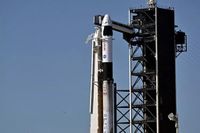The US Department of Defense has awarded a total of $13.7 billion in launch service contracts to SpaceX, United Launch Alliance (ULA), and Blue Origin. This initiative is designed to strengthen the Pentagon’s access to space for its most sensitive and high-risk missions, including those involving secure communications and missile warning systems. This is the first time that three companies will share responsibility for launching high-priority military and intelligence payloads, Caliber.Az reports via the website covering space news.
Announced on April 4 by the US Space Force’s Space Systems Command, these contracts are part of the National Security Space Launch (NSSL) Phase 3 Lane 2 procurement. SpaceX was awarded the largest portion of the contracts, with $5.9 billion in anticipated awards. ULA secured nearly $5.4 billion, while Blue Origin was allocated approximately $2.4 billion.
Under the terms of the agreement, the three companies are expected to conduct a total of 54 launches between fiscal years 2025 and 2029. Gen. Chance Saltzman, Chief of Space Operations for the US Space Force, emphasized the strategic importance of the contracts. “This is a strategic investment in assured access to space,” he said. “A robust and resilient space launch architecture is the foundation of both our economic prosperity and our national security.”
Out of the 54 planned launches, SpaceX is expected to handle 28 missions, roughly 60 percent of the total. ULA will conduct 19 missions, or around 35 percent, while Blue Origin, which has only flown its New Glenn rocket once and is still awaiting certification, will be responsible for seven missions starting in the program’s second year, contingent on the rocket's certification. The Phase 3 Lane 2 portion of the NSSL program focuses on the most complex launches to high-energy orbits, with increased mission assurance requirements. This makes it the most demanding category of national security space assignments.
Missions under the new contracts are expected to occur between fiscal years 2027 and 2032, with launches typically assigned two years in advance of their scheduled dates. The Pentagon has emphasized its need for a diversified launch capability, particularly as it faces increasing competition in space from nations like China.
Elon Musk’s SpaceX could significantly expand its share of military business as the Pentagon, faced with budget constraints, considers overhauling a program to deploy hundreds of missile-tracking satellites. Musk’s influence, as a close advisor to President Donald Trump, has raised concerns among rivals about potential conflicts of interest and the implications for competition in the aerospace sector.
SpaceX has established itself as the world’s most prolific rocket launch provider and satellite operator. The company operates more than 7,000 Starlink internet satellites in orbit, more than any other entity. With a successful track record, SpaceX has become a go-to for the Pentagon, flying everything from cargo to astronauts to some of the Defense Department’s most sensitive satellites.
Industry experts have noted that Musk's close ties to the White House could create perceptions of favoritism. Todd Harrison, a senior fellow at the American Enterprise Institute, stated, “They don’t need to cheat. They don’t need an unfair advantage. But the fact that Elon’s in the White House is going to make people wonder if there is some unfair advantage.”
Despite these concerns, Musk has stated he will recuse himself from matters that pose a conflict of interest. However, industry officials argue that his proximity to power could significantly shape policy and influence lucrative programs. “If you’re standing beside the president, as closely as you are, then people around you fall into line pretty quick,” an unnamed industry official said.
The Space Force has expressed a desire to rely on a large number of contractors that would compete against each other to drive innovation, efficiency, and lower prices. However, the reliance on SpaceX for critical contracts could contradict this goal. During a confirmation hearing for Troy Meink, Trump’s pick for Air Force secretary, concerns were raised about the implications of depending heavily on SpaceX.
The Pentagon is expected to spend $35 billion on the missile-tracking system known as the Proliferated Warfighter Space Architecture program. This system aims to deploy 300 to 500 satellites in low Earth orbit, utilizing a “tracking layer” to follow missile launches and a “transport layer” to relay data. However, the program has faced development challenges and delays, as noted by the Government Accountability Office (GAO).
Instead of relying on a few large satellites that are vulnerable to attack, the Pentagon is moving towards a strategy of “proliferated architectures,” which consist of swarms of smaller satellites that are more difficult to target. SpaceX’s experience with laser communications technology, used in its Starlink network, may provide the Pentagon with a viable solution to address existing challenges in the missile-tracking program.
In the meantime, the Pentagon has taken steps to allow for greater competition in its satellite launch programs. The recent announcement of contracts awarded on April 4, 2025, revealed that SpaceX won the majority of the lane contracts running through 2029, with ULA and Blue Origin receiving significant allocations as well. This shift aims to diversify the launch landscape, although some industry insiders remain skeptical about the ability of new entrants to compete effectively against established players like SpaceX.
As the Pentagon navigates its evolving space strategy, the balance between fostering competition and relying on proven entities like SpaceX will be critical. The landscape of military space operations is changing rapidly, and how the Pentagon adapts to these challenges will shape the future of national security in space.

